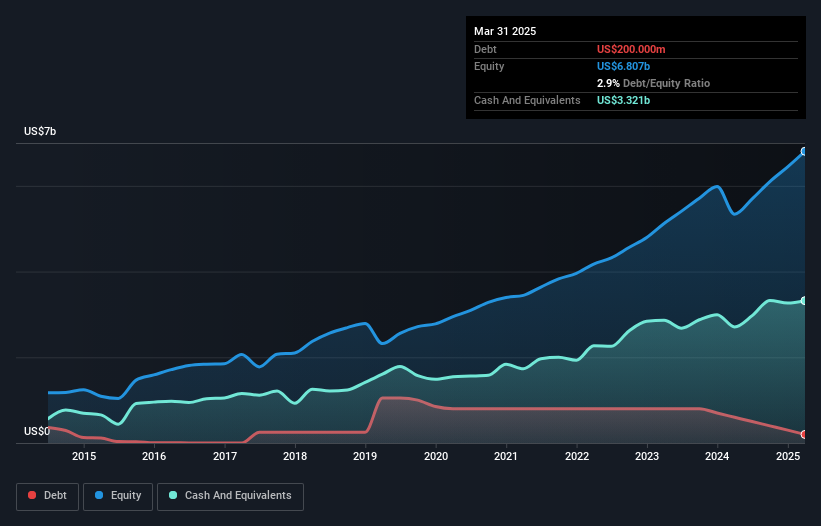
Some say volatility, rather than debt, is the best way to think about risk as an investor, but Warren Buffett famously said that 'Volatility is far from synonymous with risk.' When we think about how risky a company is, we always like to look at its use of debt, since debt overload can lead to ruin. As with many other companies United Therapeutics Corporation (NASDAQ:UTHR) makes use of debt. But the real question is whether this debt is making the company risky.
What Risk Does Debt Bring?
Debt assists a business until the business has trouble paying it off, either with new capital or with free cash flow. If things get really bad, the lenders can take control of the business. However, a more frequent (but still costly) occurrence is where a company must issue shares at bargain-basement prices, permanently diluting shareholders, just to shore up its balance sheet. Of course, the upside of debt is that it often represents cheap capital, especially when it replaces dilution in a company with the ability to reinvest at high rates of return. The first thing to do when considering how much debt a business uses is to look at its cash and debt together.
What Is United Therapeutics's Debt?
The image below, which you can click on for greater detail, shows that United Therapeutics had debt of US$200.0m at the end of March 2025, a reduction from US$600.0m over a year. However, it does have US$3.32b in cash offsetting this, leading to net cash of US$3.12b.

How Strong Is United Therapeutics' Balance Sheet?
The latest balance sheet data shows that United Therapeutics had liabilities of US$721.5m due within a year, and liabilities of US$215.2m falling due after that. Offsetting this, it had US$3.32b in cash and US$322.0m in receivables that were due within 12 months. So it actually has US$2.71b more liquid assets than total liabilities.
This surplus suggests that United Therapeutics is using debt in a way that is appears to be both safe and conservative. Due to its strong net asset position, it is not likely to face issues with its lenders. Simply put, the fact that United Therapeutics has more cash than debt is arguably a good indication that it can manage its debt safely.
See our latest analysis for United Therapeutics
Also good is that United Therapeutics grew its EBIT at 18% over the last year, further increasing its ability to manage debt. There's no doubt that we learn most about debt from the balance sheet. But it is future earnings, more than anything, that will determine United Therapeutics's ability to maintain a healthy balance sheet going forward. So if you're focused on the future you can check out this free report showing analyst profit forecasts.
Finally, while the tax-man may adore accounting profits, lenders only accept cold hard cash. While United Therapeutics has net cash on its balance sheet, it's still worth taking a look at its ability to convert earnings before interest and tax (EBIT) to free cash flow, to help us understand how quickly it is building (or eroding) that cash balance. During the last three years, United Therapeutics produced sturdy free cash flow equating to 70% of its EBIT, about what we'd expect. This free cash flow puts the company in a good position to pay down debt, when appropriate.
Summing Up
While we empathize with investors who find debt concerning, you should keep in mind that United Therapeutics has net cash of US$3.12b, as well as more liquid assets than liabilities. The cherry on top was that in converted 70% of that EBIT to free cash flow, bringing in US$1.1b. So we don't think United Therapeutics's use of debt is risky. We'd be very excited to see if United Therapeutics insiders have been snapping up shares. If you are too, then click on this link right now to take a (free) peek at our list of reported insider transactions.
When all is said and done, sometimes its easier to focus on companies that don't even need debt. Readers can access a list of growth stocks with zero net debt 100% free, right now.
Have feedback on this article? Concerned about the content? Get in touch with us directly. Alternatively, email editorial-team (at) simplywallst.com.
This article by Simply Wall St is general in nature. We provide commentary based on historical data and analyst forecasts only using an unbiased methodology and our articles are not intended to be financial advice. It does not constitute a recommendation to buy or sell any stock, and does not take account of your objectives, or your financial situation. We aim to bring you long-term focused analysis driven by fundamental data. Note that our analysis may not factor in the latest price-sensitive company announcements or qualitative material. Simply Wall St has no position in any stocks mentioned.